Previously we discussed part of a statement titled “October 7th: One Year On” which was put out by the BBC’s CEO of News, Deborah Turness, on October 1st:
PROPAGANDA, HATE SPEECH AND DISINFORMATION: THE BBC’S IDEA OF ‘A RANGE OF PERSPECTIVES’
Another part of that statement reads as follows:
“Over the course of the conflict, we have thoughtfully reviewed our coverage, carefully taking into consideration feedback from all interested parties – and we will continue to do so. Where we have made changes, we have done so with transparency, to explain the context to our audiences and how it impacts our journalism.
And so I would like to use the opportunity at this one-year mark to be fully transparent about the serious and consequential constraints on our ability to report independently on this war.
“The Pursuit of Truth” is the most critical role of the BBC. Independent journalism means being on the ground, being there to witness events, being present to produce a “first draft of history”. Being an eyewitness to war requires courage – but it also requires access.
Israel is not allowing international journalists from media organisations, including the BBC, independent access to Gaza. Our correspondents are not able to verify the facts on the ground, to independently record for history the events unfolding, or the scale of the human suffering. The BBC is backing the current Foreign Press Association case before the Supreme Court in Israel to give international journalists access to Gaza, and we are calling urgently to be granted access.”
In other words, the CEO of BBC News and Current Affairs is telling critics of the BBC’s coverage of the war between Hamas and Israel that the responsibility for under par reporting lies with Israel, because it is not allowing foreign journalists to enter the Gaza Strip on their own. Notably, Turness fails to clarify that Egypt has taken the same approach.
It is of course worth remembering that the BBC used to have foreign journalists stationed in the Gaza Strip on a permanent basis. That changed following the kidnapping of Alan Johnston in 2007. While the BBC retained its Gaza bureau with local staff, its foreign correspondents visited the territory from time to time rather than being based there.
In other words, on October 7th 2023 the BBC – including its Arabic branch – did have staff in the Gaza Strip – as its reports at the time show. Later, some members of the BBC’s local staff, including Rushdi Abualouf, left the Gaza Strip and since then, the corporation has been working with unidentified freelancers.
Apparently though, the BBC is not sufficiently convinced that those freelancers are “able to verify the facts on the ground” and so for months it has been claiming that only foreign reporters can, as Turness puts it, “independently record for history the events unfolding”.
As we noted when Jeremy Bowen made the same claim in March, the BBC’s record shows that even at times when foreign BBC journalists have had free access to the Gaza Strip during periods of violence and armed conflict, their physical presence on the ground did not guarantee accurate and impartial coverage.
THE BBC’S OWN RECORD DEBUNKS JEREMY BOWEN’S ‘FREE ACCESS’ CLAIMS
While Turness notes that the BBC “is backing the current Foreign Press Association case before the Supreme Court in Israel to give international journalists access to Gaza”, she does not clarify that the current case is the second one to have been submitted or that the Supreme Court rejected the previous one in January on the grounds that reporters could endanger IDF forces by reporting their positions. Interestingly, Turness does not address the issue of the safety of international journalists in a location which local journalists have left, citing safety as the reason.
Turness’ statement goes on:
“And as the conflict spreads to Lebanon, we are being blocked there too – by Hezbollah – from independently reporting. Our correspondents have been barred from entering some areas hit by Israeli air strikes, and in some cases are being denied access to hospitals to interview injured civilians and verify the numbers of dead.”
However, the BBC’s record of reporting does not entirely support that portrayal.
In this report (from 03:37) from July, the BBC’s Orla Guerin is seen at a Hizballah rally in Beirut.
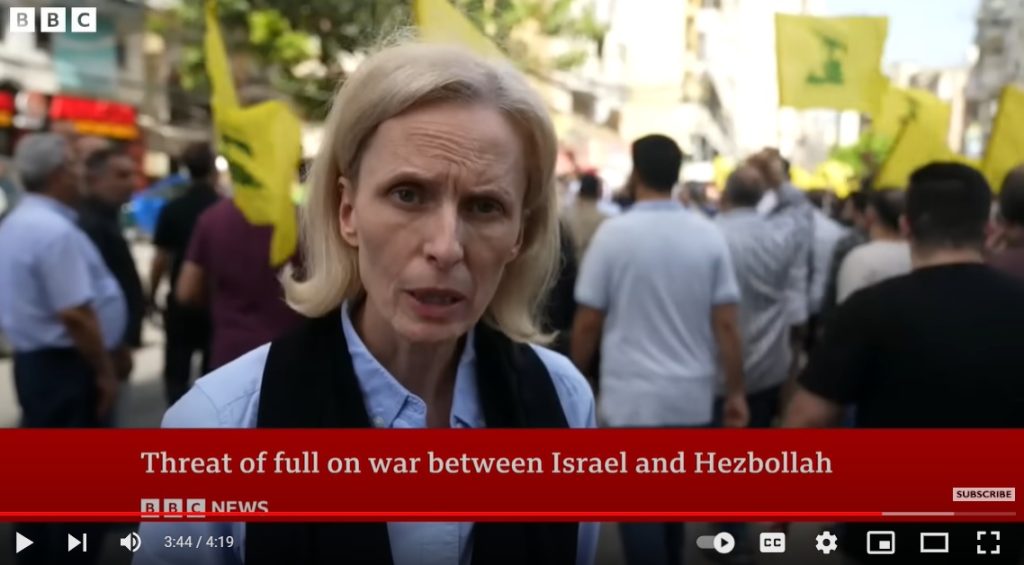
Also in July, another BBC reporter based in Beirut tweeted a claim provided to her by a Hizballah official:
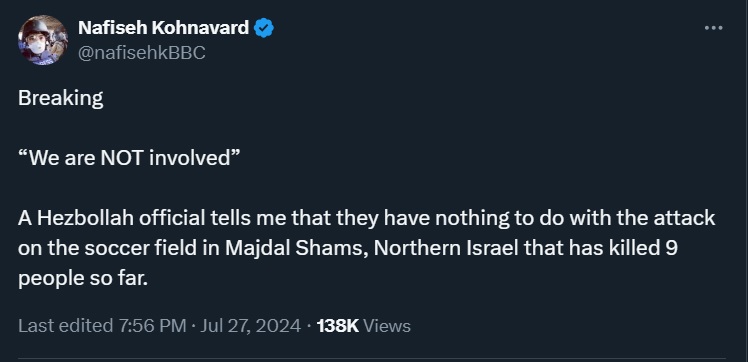
In September Orla Guerin produced a report about a surgeon who has treated “fighters from Hezbollah” following the explosions of communications devices. Also in September, Hugo Bachega managed to produce a report on the same story, despite telling readers that:
“In Dahiyeh, Hezbollah supporters stopped our team several times, demanding we did not use our phones or our camera.”
Bachega was able to report from the Dahiya neighbourhood – which he described as “a Hizballah stronghold” – during the funerals of people killed in the exploding pagers incident and Guerin managed to report on the same day from a nearby street and to promote a Hizballah video.
On September 22nd Guerin reported from the location of the funeral of a Hizballah commander in the Dahiya neighbourhood and the following day she and two of her Beirut bureau colleagues produced a vox pop report about evacuees, with similar filmed and written reports also having been produced by Carine Torbey, Lina Sinjab and Nafiseh Kohnavard.
On September 25th Hugo Bachega produced a report which includes an interview with Lebanon’s minister of health and Orla Guerin appears to have had no trouble travelling to southern Lebanon to produce reports from Tyre and from Shebaa or to the east to report from the Bekaa Valley.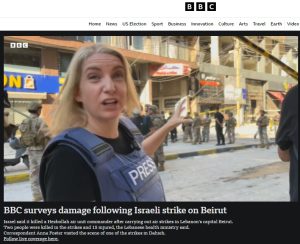
On September 26th Anna Foster reported from the scene of a strike in the Dahiya area of Beirut with “members of Hizballah in the street” and September 27th saw Hugo Bachega reporting on another strike in the same neighbourhood while in a car, claiming that “we tried to get out of the car but we were stopped by a group of men”. The following day, Orla Guerin also reported from that location, stating:
“We spotted Hezbollah members, guarding an air strike location, one brandishing a Kalashnikov. That’s a sign of tension, or desperation – as normally the armed group doesn’t show its weapons on the streets.
Hezbollah was not watching our every move today – they were more focused perhaps on the threat from above.”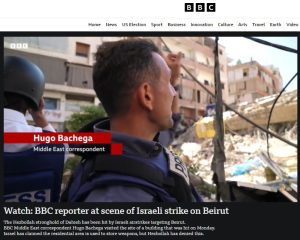
On September 30th the Beirut bureau’s Carine Torbey reported from the scene of a strike on PFLP terrorists in the Kola neighbourhood of Beirut and in the following days Hugo Bachega reported from the scene of a strike in the Dahiya neighbourhood and Sally Nabil reported on a strike in Beirut’s Bachoura area.
In this report from October 1st – the day that Turness’ statement was published – Orla Guerin tells BBC audiences at 12:57 that:
“Hizballah brought us to this site to show us the damage.”
In a report published by Guerin on October 5th, she states:
“And then there is the Hezbollah factor. Even as the armed group is trying to hold off invading Israeli troops on Lebanese soil, it is controlling the international media in the city of Tyre. It limits our movements, though it has no control over what we write or broadcast.” [emphasis added]
In other words, notwithstanding Turness’ portrayal, journalists at the BBC’s Beirut bureau have managed to report from multiple sites of air strikes, to visit hospitals, to interview doctors and evacuees and even to get quotes and organised press trips from Hizballah.
Of course, if the BBC really is being “blocked from independently reporting” in Lebanon by Hizballah as Turness claims, its reports should clearly communicate that to audiences, as was the practice in Iraq two decades ago. The same of course applies to Hamas-imposed restrictions on reporting from the Gaza Strip. However, as we saw in previous BBC coverage of conflicts in the Gaza Strip, such transparency was long since abandoned.
Related Articles:
‘WHEN DID YOU STOP BEATING YOUR WIFE?’ REPORTING FROM THE BBC
MAPPING CHANGES IN THE BBC’S DISCLOSURE OF RESTRICTIONS ON JOURNALISTS

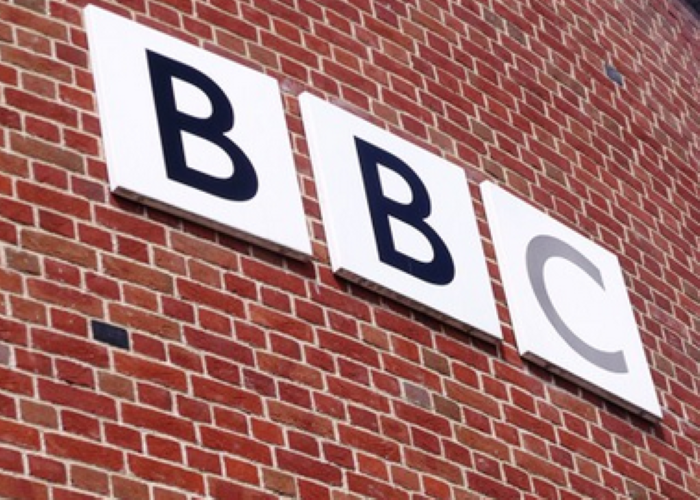

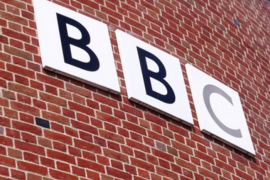
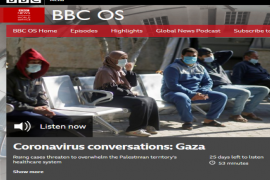
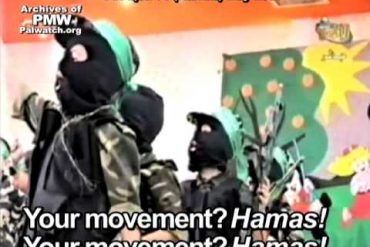
Maybe BBC should be reminded that apart from WW1 and WW2 when BBC own correspondents were obliged to follow military law and wear uniforms when reporting. Further to bring things up to dater the UK Ministry of Defence ordered the few correspondents allowed on the Falkland task force to be strictly embedded with the Navy and when forces landed they certainly could not stray and relied only on the forces spokesmen for information. The same practice was followed in both the Gulf and Afghan war. I cannot recall the BBC complaining or organising a campaign against their own government or supporting a High Court action with the Foreign Press Association.
Once again this proves, if necessary, the BBC’s hyprocrital obsession with Israel
Turness has a problem with the truth!